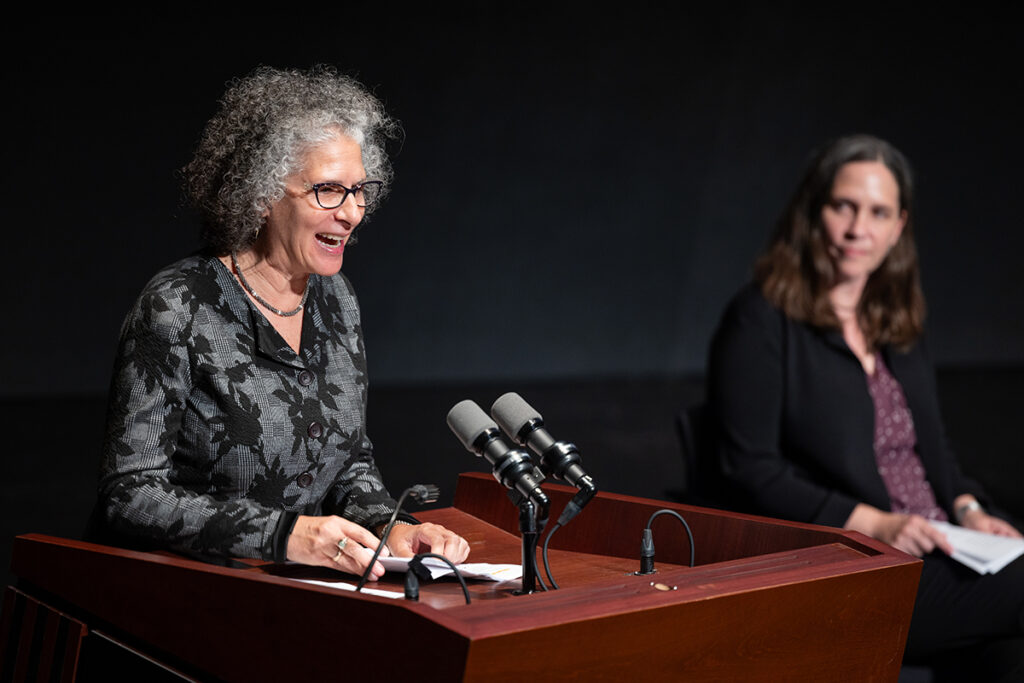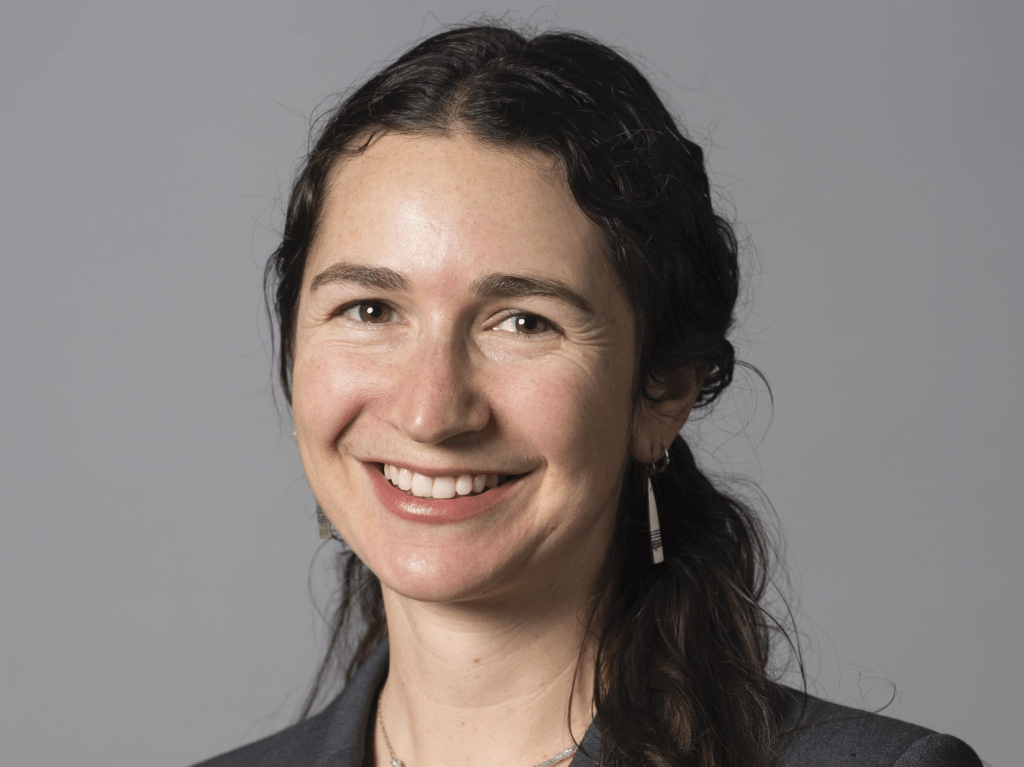Marlboro Institute Panel Looks at Election Impact on Three Major Issues
Emerson faculty provided looked ahead on several high-profile issues, including reproductive rights, immigration policy, and U.S. foreign policy, in the wake of the Nov. 5 presidential election, in a panel sponsored by the Marlboro Institute for Liberal Arts and Interdisciplinary Studies.
Led by Dean of Liberal Arts Amy Ansell, the Nov. 12 panel shed light on current challenges and the importance of sustained activism.

Ansell set the tone for the discussion by urging attendees to channel their emotions into informed action.
“I know when people say, ‘Don’t throw up your hands but rather roll up your sleeves to get to work,’ it can seem like a daunting task,” said Ansell. “Regardless, this is a time, as we prepare for these next few years of democratic engagement, to really invest in analysis and in the refinement of critical frameworks that will guide the work.”
The first topic of discussion was reproductive rights, led by Senior Executive-in-Residence Nancy Lyons. Lyons discussed bodily autonomy and the increasing restrictions on access to life-saving medications and treatments in some states, noting that the new regulations and limitation have resulted in loss of life.
“Preserving the life of a woman does not equate to preserving her health,” said Lyons. “The potential impact to future child-bearing or long-term health is often not a consideration.”
Lyons also expressed deep concern about growing barriers to medication-based abortion, including a safe procedure using mifepristone that has been available in the U.S. for more than 20 years.
“We have already seen pharmacists who are refusing to fulfill prescriptions for these drugs,” said Lyons. “Some are attempting to control access to reproductive health care by labeling these medications as dangerous substances, similar to fentanyl.”
She also highlighted that many states have enacted laws restricting abortion access, banning access as early as early as six-weeks or 12-weeks, when most people do not yet know they are pregnant.
Amid these challenges, Lyons shared a hopeful update on the fight for abortion rights:
“The one bit of good news that I can give is that Arizona and Missouri just passed constitutional ballot amendments that enshrine the rights of abortions in their states,” said Lyons. “So those two states hopefully will switch to not having a ban.”
The Language of Immigration
Mneesha Gellman, Marlboro Institute Associate Professor and Director of the Emerson Prison Initiative, explored immigration policy, emphasizing the urgent need to shift away from dehumanizing language in media portrayals.

“The way that migrants are dehumanized in the media is really something that needs to be changed. These are people’s children, parents, and partners,” said Gellman. “Some people tend to use terms like illegal immigrants and illegal aliens — I do not use that language. Instead, I prefer talking about people who are undocumented or out of status. This refers to immigrants who do not possess lawful entrance or work authorization, but it is still a more humanizing language.”
Gellman outlined the various pathways to citizenship, stressing that changes in administration could lead to significant shifts in these processes, highlighting how the first Trump administration enacted “472 administrative changes” that reshaped the U.S. immigration system.
“These changes included severely diminishing humanitarian protections for certain categories of people, attempting to close off more of the US-Mexico border, and randomizing immigration enforcement,” said Gellman. “This undermined the existence of safe zones for people, turning places like schools and courts -previously understood to be no arrest zones – into arrest possible zones.”
She noted that a mass deportation approach would be costly, with estimates ranging from $88 billion to $300 billion annually.
“It’s extremely expensive to actually run the infrastructure required to do mass deportation,” said Gellman. “So immigration officers, judges, detention facilities, plane flights, all of that stuff costs money. So there’s a very pragmatic and budgetary question.”
Gellman urged students with concerns about mass deportation to contact their local and congressional representatives.
“You don’t have to have a specific bill or a specific issue in mind to reach out,” she explained. “You can simply call and say, ‘I am a voter, I’m concerned about the mass deportation rhetoric I’m hearing. I want to express my support for immigrants in my community and encourage my representative to take actions that support them.’”
Impact on U.S. Foreign Policy
Marlboro Institute affiliated faculty member Alireza Raisi led a discussion on the impact of U.S. foreign policy, specifically focusing on environmental policy and economic security, areas he deemed most vulnerable to change.
Raisi started by discussing the Paris Agreement, an international effort to mandate reductions in greenhouse gas emissions.
“The Paris Agreement took years of negotiation to reach, and set out specific targets for reducing emissions,” said Raisi. “But when the Trump administration withdrew, it had devastating impacts not only on the United States, but globally.”
As Raisi outlined, the withdrawal from the Paris Agreement severely undermined international efforts to curb climate change, with implications that are expected to worsen.
“China has argued that if the United States doesn’t contribute to reducing greenhouse gasses, they won’t either,” he explained. “This is because reducing emissions has direct economic impacts. For an economy to grow, energy consumption typically increases, which often leads to higher greenhouse gas emissions.”
He detailed how rising global temperatures — predicted to increase between 2 to 5 degrees Celsius, depending on policy adherence — are already impacting regions like the Sahel region in Africa, Middle East, and North Africa.
“While the United States hasn’t yet experienced the full extent of climate change’s impacts, the devastation is already unfolding in these regions,” said Raisi.
Raisi also shared accounts of the human toll of climate change, drawing from his observations during travels to the Middle East.
“I’ve seen farmers forced to abandon their livelihoods and migrate to major cities, where they work for companies like Uber, because they have no other source of revenue,” said Raisi. “Most of the time, they can’t afford housing, so they sleep in their cars while working long nights. They often share stories of the glorious past that they had, and they can no longer afford that.”
Categories